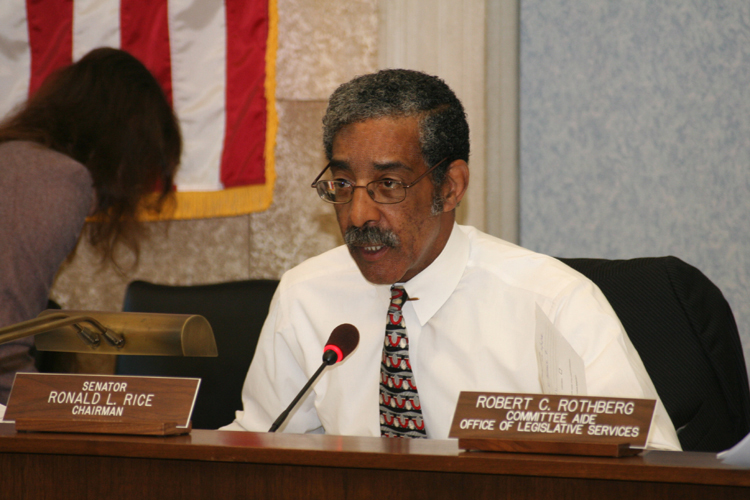
Bill Would Create Greater Openness, Fairness in Eminent Domain Process
TRENTON – A bill sponsored by Senator Ronald L. Rice which is intended to create more openness and fairness for homeowners under the eminent domain process was approved by the Senate Community and Urban Affairs Committee by a vote of 3-1, with one abstention.
“Done the right way, eminent domain can be a useful tool to redevelop communities in need and provide public benefit,” said Senator Rice, D-Essex. “However, local officials have to exercise eminent domain powers carefully, and make sure that they communicate with homeowners and treat them with fairness in eminent domain negotiations. It may be a useful public redevelopment and renovation tool, but if it’s abused and misused, eminent domain can be a prime example of government run amuck.
“I want to thank Senate President (Stephen) Sweeney and Assemblyman (John) Burzichelli for working with me last session to reach a compromise on this legislation,” added Senator Rice. “Incorporating everyone’s viewpoints, I believe we ended up with a far better bill than when we started.”
The bill, S-1451, would make a number of changes to the “Local Redevelopment and Housing Law,” the “Eminent Domain Act of 1971,” and the “Relocation Assistance Act,” the three statutes which currently dictate the provisions of the eminent domain process to local officials. Under Senator Rice’s bill, local officials would have to provide a property owner with information, and an opportunity to provide feedback about the process, before they can take private property. Under the bill, local officials would be required to:
• Provide a copy of the appraisal being used to determine the amount offered to purchase the property;
• Allow the property-owner to provide information or raise issues with the appraisal being used on their property;
• Direct the appraiser to consider the property owner’s information or issues with the initial appraisal – as well as any value attributable to the location of the property – in determining fair market value for a property;
• And provide a property owner with a 45-day window to review the purchase offer, extendable up to 70 days, in order to request more information from local officials, request a meeting with officials or their representatives, and obtain their own appraisals on the property.
“Communication is a key component to fairness in eminent domain proceedings,” said Senator Rice. “We need to give property owners an opportunity to provide information which will ultimately be considered in determining the fair market value of their property. This provision of the bill would create a safeguard against abusive, unilateral action by local officials and ensure that property owners’ concerns are being addressed.”
The bill would also increase benefits under the “Relocation Assistance Act” for property owners whose property is taken under eminent domain, for the first time since the bill was enacted in 1971. This provision would enhance rental assistance for people whose property has been condemned or acquired through eminent domain proceedings, and would establish automatic annual increases to statutory relocation assistance payments to reflect inflation.
The bill would authorize municipal master plans to contain a redevelopment plan element to identify redevelopment and rehabilitation areas, and would allow municipalities to continue to use eminent domain in order to redevelop blighted areas. At the same time, the bill would establish greater protections for property owners and others impacted by condemnation for redevelopment purposes, requiring enhanced notice and greater opportunity to express their concerns for people affected by eminent domain in redevelopment situations. And the bill would include measures designed to ensure that owners whose properties are taken for redevelopment projects are fairly compensated for their property.
“This bill strikes a fair balance between the intended purpose of eminent domain and the impact it can have on property owners,” said Senator Rice. “At the end of the day, we don’t want to hamstring local governments, but we want to make sure people are treated fairly and with respect.”
Finally, the bill would amend current law to revise criteria used to determine whether or not an area is blighted, and thus qualifies for eminent domain for redevelopment purposes. Senator Rice’s bill would require municipalities to use criteria consistent with the State Constitution as interpreted by the New Jersey Supreme Court decision in Gallenthin Realty Development, Inc., v. Borough of Paulsboro, 191 N.J. 344 (2007). This provision would impose objective, Statewide standards to the determination of blight for the purposes of redevelopment.
“There are 566 municipalities in the State of New Jersey, and we can’t have 566 different standards for what is or what isn’t a blighted area within those municipalities,” said Senator Rice. “This provision assures property owners that the standards and criteria being used to condemn their property are fair, objective and limited. It creates a level playing field and ensures basic continuity from one redevelopment eminent domain case to the next.”
The bill now heads to the Senate Budget and Appropriations Committee for review, before going to the full Senate for consideration.

